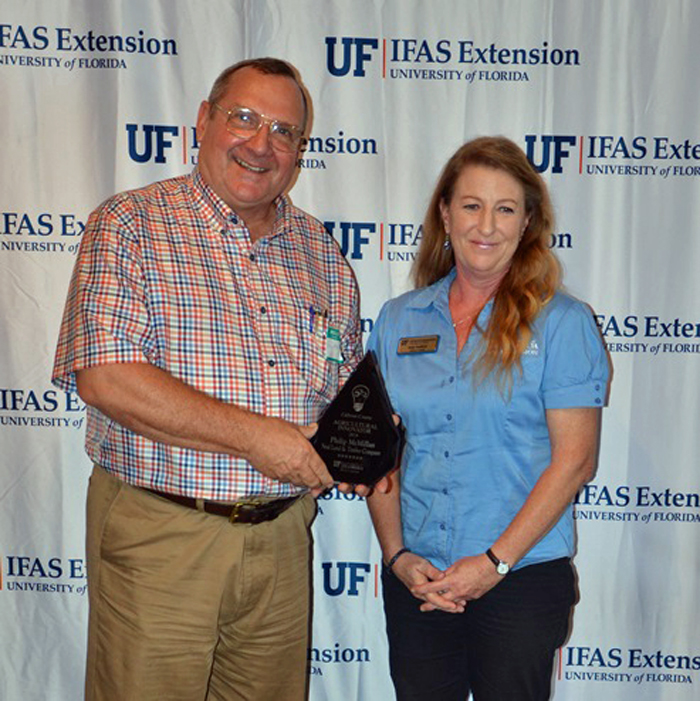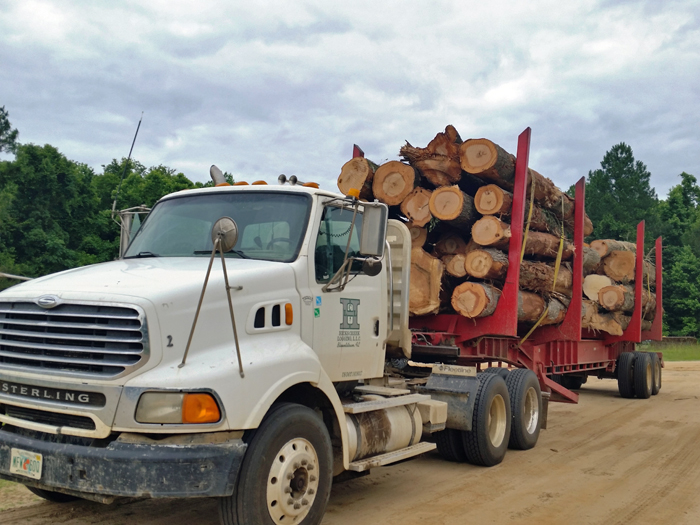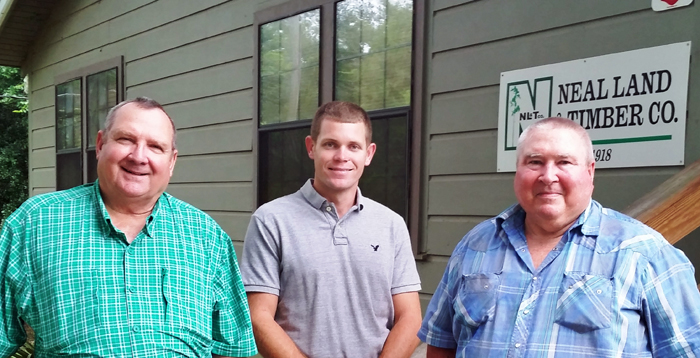
Phillip McMillan was recognized as the Calhoun County Agricultural Innovator by Judy Ludlow, Calhoun County Extension.
On Thursday August 21, 2014, twelve Innovative Farmers and Ranchers were recognized by University of Florida IFAS Extension and Farm Credit of Northwest Florida at the Jefferson County Opera House, in Monticello. This is the fourth year these two organizations have teamed up to honor a selection of the most innovative farmers from the Florida Panhandle.
The purpose of the Agriculture Innovator Recognition Program is to annually recognize innovative farmers and ranchers from 16 Florida Panhandle counties, from Jefferson west to Escambia County. In 2014, County Agriculture Extension Agents selected 12 Agricultural Innovators to be recognized.
All of the honorees have distinguished themselves as creative thinkers and leaders in the agricultural community. From this group of elite farmers that were honored by their home county, one is selected annually to represent Northwest Florida. This year Phillip McMillan was selected as the Calhoun County Agriculture Innovator. McMillan was nominated by Judy Ludlow, Calhoun County Extension Director. Read more about McMillan and Neal Land & Timber Company below. The other Agricultural Innovators nominated this year will be featured on the Panhandle Ag e-News over the coming weeks.

McMillan created a floodplain hardwood timber 50-year rotation, that includes intermediate thinning of hardwoods every 15–20 years. Photo credit: Judy Ludlow
Phillip McMillan – Calhoun County Agricultural Innovator
Submitted by Extension Agent: Judy Ludlow
Neal Land and Timber Company was founded in 1923, Neal Land and Timber Company’s tree farm was one of the first 50 to open in Florida. At that time, choice timber was harvested from their land to provide basket veneer for the wire-bound wood crates which carried Florida’s citrus to markets throughout the Southeast. Eventually, market demand for basket veneer declined in the 1960s and Neal Land
and Timber shifted to pine and hardwood production. Philip McMillan inherited this rich and fascinating land management history when he began his tenure with Neal Land and Timber Company in 1980. He now manages 40,000 acres of upland pine, and 42,000 acres of
hardwood floodplain along the Apalachicola River.
Philip’s innovations are defined by the educated risks he took in challenging accepted hardwood timber production protocols. Basing his management decisions on his own observations, education, and on words of wisdom from his predecessors, Philip created a sustainable floodplain hardwood timber base centered on a 50-year rotation. The unique innovation is that this rotation includes intermediate thinning of hardwoods every 15–20 years, in which the thinned trees provide profitable income just as a pine tree harvest does for pulp and wood-fiber products. These profitable thinnings can occur as many as three times in the 50-year cycle. The remaining valuable hardwood trees are “released” after the thinning to accelerate their growth to become mature and highly sought after hardwood lumber for high-end markets. After 50 years, the process is renewed. To Philip’s knowledge, this operation is the only of its kind in Florida.
An interesting aspect to this innovative process is the placement and size of the thinned and ultimately clear-cut land for hardwood rejuvenation. Philip realized the powerful influence the annual and variable flooding of the Apalachicola River has on the woodlands, and
designed clear cuts that, by their very shape, size, and placement, could support and re-seed the next generation of hardwood forest. Philip’s innovations have created a renewable, profitable resource for floodplain hardwood timber in the Southeast.

Invasive Chinese tallow tree control study on Neal Land & Timber property. Photo credit: Judy Ludlow
Cooperative Work with the Extension Service
Growing trees can be thought of as Florida’s “longterm” Agriculture. The timber industry is challenged by the same issues that producers face in row-crop and other farming operations. In managing the 80,000 acres of timber, Philip is routinely integrating factors caused by disease, pests, weather, and the economy. To that end, Philip is always interested in learning about new techniques and has opened up his lands to UF/IFAS faculty and graduate students conducting invasive species management research. Philip is currently participating with UF/IFAS faculty on herbicide trials to control invasive tree species such as Chinese tallow and Chinaberry, and also on coyote population and food habit studies. He also supports UF/IFAS Extension by donating trees for fundraisers and by always being available if we have questions.

Phillip McMillan, Matthew Stokes, and Graham Dozier of Neal Land & Timber Company. Photo credit: Judy Ludlow
Leadership in the Agriculture Industry
To quote Philip McMillan: “If there is one thing we’ve learned about longevity in this business, it is that, in order to stay around, you must preserve the land and the timber. Since its inception, Neal Land & Timber has been investing in the land and caring for our environment. Today, these best practices are better known as sustainable land management. Since forests are a renewable resource, today’s timber industry understands that the business is more than just cutting down trees. It involves respecting the land, the water, and the wildlife as well.”
Philip’s management practices clearly respect the land, water, wildlife, and surrounding communities as well. He has served on the board of the Northwest Water Management District, and routinely donates resources to the community. As a result, Neal Land and Timber is highly regarded for its unique, sustainable, and integrated agricultural operations in Florida.
You might also be interested in the stories of other Agricultural Innovators highlighted in previous weeks:
-
Yoder Family Escambia County Agricultural Innovators
-
Ray & Wanda Davis Santa Rosa County Agricultural Innovators
-
Greg Evers Okaloosa County Agricultural Innovator
-
Nolan Adams Walton County Agricultural Innovator
-
Marvel & Justin Williams Holmes County Agricultural Innovator
-
George Fisher Honored as Washington County Agricultural Innovator
-
Cindale Farms Honored as Jackson County Agricultural Innovators
- Maintaining Dissolved Oxygen Levels in Your Pond to Reduce Fish Kills - September 21, 2018
- The Bumble Bee – One of Florida’s Vital Pollinators - September 14, 2018
- 2017-2018 Bee Informed Partnership’s National Bee Colony Loss Report - July 13, 2018
